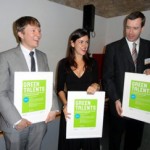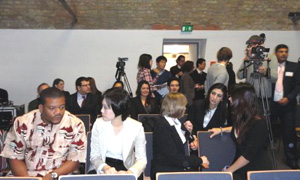
Green Talents, according to an official document, is a competition, an international forum for high potentials in sustainable development, with which to attract scientists from all over the world, and at the same time offering them a platform to expose their talents. The winners are then invited to Germany to visit the major centres of environmental and sustainable development research.
Although this is a very new venture, its impact is considerable. According to Parliamentary State Secretary Mr Thomas Rachel, who awarded the certificates to the winners on behalf of Minister Schavan, this year’s competition attracted 331 applications from 58 countries. Previously the figures were 156 from 43 in 2009; and 234 from 57 countries in 2010.
The winners are also given an opportunity to spend a further three months stay to partake in research projects at various institutions. This offer was accepted by 5 of the winners in 2009; in 2010 the figures were 14 from 20. The figures for the present, has not been finalised.
Encouraged by the success of this programme prompted Mr Rachel to say: “Achieving sustainability is a global challenge and undertaking schemes like Green Talents help to promote that cultural plurality and creativity which encourages the development of global solutions. That is why we intend to intensify global exchanges between young researchers in the field of environmental and sustainability research”.
Prof Klaus Töpfer, an internationally recognized environmentalist, and a former Minister in the German Cabinet, was a member of the jury of high-ranking German experts from science and industry.
The jury rewarded Ms Rebello (24, Stellenbosch University) whose focus was on Conversation Ecology, because: “Her application impressed the jury because of her interdisciplinary approach to addressing sustainability challenges such as conservation of biodiversity while increasing capacities for human development, for example in agriculture. She ‘walks the talk’ by contributing to a better environment for a better society”.
Ms Rebelo believes that interdisciplinary research in science and technology is the best hope for improving the efficiency of global resource use, most importantly that of water and energy. “The tours of companies and institutions that have been highlighted for the best practices in sustainability will give me a unique opportunity to bring ideas, innovations and inspiration back to my country and strengthen collaborative ties with overseas institutions for my PhD studies”.
Dr Randall, (27 – University of Cape Town) got the jury’s nod for his focus on Crystallization and Precipitation to Treat Waste Water

“I feel that there is no single solution to the problems associated with waste water, and that is only possible through a combination of technologies that a truly sustainable water treatment method can be achieved”, added the young scientist.
Dr Horwood, (32 – Specialist Consultant Johannesburg) impressed the jury with his focus on: Water Policy and Governance in South Africa
“As a specialist in water governance, Dr Horwood is dedicated to the socio-economic development of his home country and the upliftment of all its people, while ensuring long-term conservation of natural resources, particularly water”.
Owen Horwood has focussed his studies on issues regarding water sector reform in South Africa, with emphasis on stakeholder participation and institutional functionality, often overlooked by researchers. His PhD thesis addressed the challenges of implementing South Africa’s National Water Resource Strategy within the context of the new National Water Act. He is keen to visit and work in Germany in order to compare the German experience in sustainability with current policy thinking and future planning in South Africa.
“As a young research scientist, there is much to be learnt from Germany’s expertise and experience in the sustainability field and the country’s paradigm shift from knowledge-orientated to interdisciplinary, solution-orientated research. I want to be a participant rather than a spectator and work towards reconciling the often competing priorities of growth and sustainability”, Dr Horwood emphasised.
During their short journey to Germany, their home country was hosting the COP17 Environmental Conference. Not everybody is satisfied with the agreement reached in Durban. But, the three young people from South Africa are of the opinion that it has served to bring home the awareness of environmental protection to the African continent. But much has still to be done on this topic.
Dr Owen Horwood sums it up thus: “The South African Government has put in a lot of effort into the COP17 talks in Durban which is quite positive, thereby laying a firm foundation for taking the issues further and realising a more permanent agreement in five to ten years time. As a platform it has been very useful. Negotiations are after all, always very complex when it comes to the interests of the rich industrially developed countries on the one hand and the developing countries on the other. But it is an important step in creating possibilities for further talks down the line”.
By Eric Singh, ANA Snr Editor
